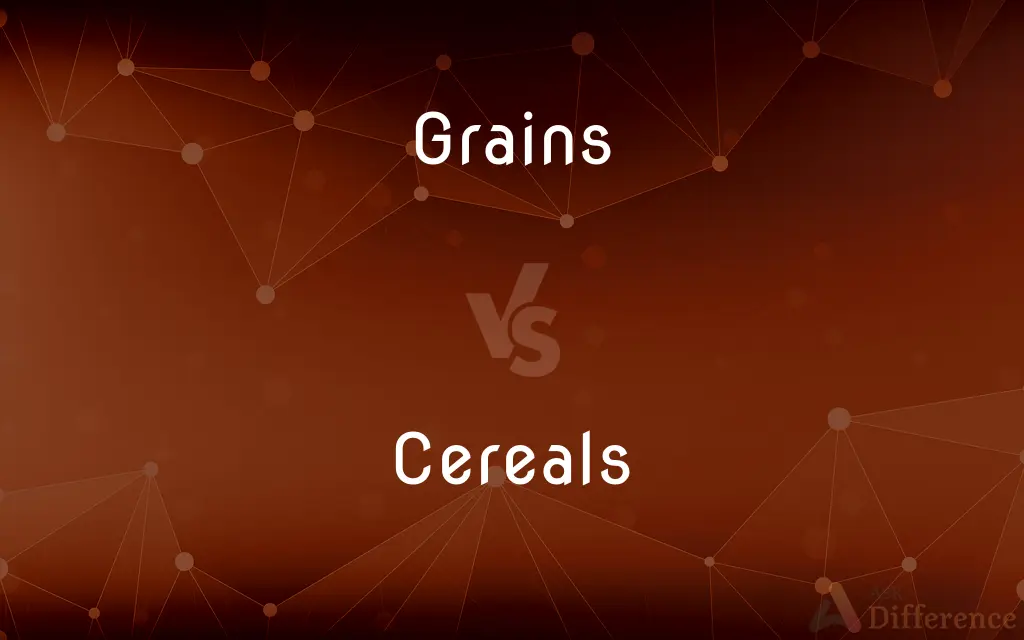Grains vs. Cereals — What's the Difference?
Edited by Tayyaba Rehman — By Fiza Rafique — Published on December 11, 2023
Grains are small, hard seeds from various plants, while cereals specifically refer to grains produced by grasses used for food.

Difference Between Grains and Cereals
Table of Contents
ADVERTISEMENT
Key Differences
Grains are the small, dry seeds of plants, harvested for consumption or planting. They are a staple in diets worldwide. Cereals, a subset of grains, specifically come from grasses like wheat, rice, or corn and are primary sources of global food.
Cereals are grown specifically for the edible components of their grain, which is a type of fruit called a caryopsis. Grains can include seeds from various plants, not just grasses, encompassing a broader category.
When processed, grains can take many forms like flour or meal, and include seeds like quinoa and barley. Cereals, however, are often associated with processed breakfast foods but also include unprocessed forms like rice or oats.
Grains can be whole, where the entire seed is used, or refined, removing parts of the seed. Cereals are often consumed as whole grains, providing essential nutrients and fibers.
Cereals are a type of grain, making them intrinsically linked yet distinct. Grains represent the broader category, while cereals are a more specific subset focused on certain types of plants.
ADVERTISEMENT
Comparison Chart
Definition
Seeds of various plants.
Grains from grasses.
Types
Includes legumes, nuts.
Wheat, rice, corn, etc.
Usage
Broad, diverse uses.
Often food crops.
Processing Varieties
Whole, refined, etc.
Mostly whole grains.
Botanical Classification
Broader category.
Subset of grains.
Compare with Definitions
Grains
Seeds of plants used for food.
We stored various grains like wheat and rice for the winter.
Cereals
Grasses cultivated for edible grains.
Farmers harvested cereals like wheat and barley.
Grains
A small, hard particle.
A few grains of sand stuck to his feet.
Cereals
A breakfast food made from processed grains.
He poured milk over his bowl of cereal.
Grains
The smallest possible amount.
He didn't have a grain of doubt about her honesty.
Cereals
The grains of cereal plants.
We stored cereals for the winter.
Grains
A small, dry, one-seeded fruit of a cereal grass, having the fruit and the seed walls united
A single grain of wheat.
Gleaned the grains from the ground one at a time. Also called caryopsis.
Cereals
Pertaining to edible grains.
Cereal products like bread and pasta are staples in many diets.
Grains
The fruits of cereal grasses especially after having been harvested, considered as a group
The grain was stored in a silo.
Cereals
Relating to grain or the plants that produce it.
The cereal crops were ready for harvest.
Grains
A cereal grass
Wheat is a grain grown in Kansas.
Cereals
A grass such as wheat, oats, or corn, the starchy grains of which are used as food.
Grains
Cereal grasses considered as a group
Grain is grown along the river.
Cereals
The grain of such a grass.
Grains
A relatively small discrete particulate or crystalline mass
A grain of sand.
Cereals
Any of several other plants or their edible seeds or fruit, such as buckwheat or certain species of amaranth.
Grains
A small amount or the smallest amount possible
Hasn't a grain of sense.
Cereals
A food prepared from any of these plants, especially a breakfast food made from commercially processed grain.
Grains
(Aerospace) A mass of solid propellant.
Cereals
Consisting of or relating to grain or to a plant producing grain.
Grains
Abbr. gr. A unit of weight in the US Customary System, an avoirdupois unit equal to 0.002285 ounce (0.065 gram).
Cereals
Plural of cereal
Grains
The markings, pattern, or texture of the fibrous tissue in wood
Cherry wood has a fine grain.
Grains
The direction of such markings
Cut a board with the grain.
Grains
The side of a hide or piece of leather from which the hair or fur has been removed.
Grains
The pattern or markings on this side of leather.
Grains
The pattern produced, as in stone, by the arrangement of particulate constituents.
Grains
The relative size of the particles composing a substance or pattern
A coarse grain.
Grains
A painted, stamped, or printed design that imitates the pattern found in wood, leather, or stone.
Grains
The direction or texture of fibers in a woven fabric.
Grains
A state of fine crystallization.
Grains
Basic temperament or nature; disposition
It goes against my grain to ask for help.
Grains
An essential quality or characteristic
"Toughness as a virtue ... is, needless to say, fully embedded in the American grain" (Benjamin DeMott).
Grains
(Archaic) Color; tint.
Grains
To cause to form into grains; granulate.
Grains
To paint, stamp, or print with a design imitating the grain of wood, leather, or stone.
Grains
To give a granular or rough texture to.
Grains
To remove the hair or fur from (hides) in preparation for tanning.
Grains
To form grains
The corn began to grain.
Grains
Plural of grain
Grains
Infl of grain
Grains
The texture or pattern on wood.
The table's surface revealed the natural grain of the oak.
Grains
A unit of measurement in weight.
The medicine was measured in grains for precision.
Common Curiosities
What defines cereals?
Grains produced by grasses like wheat and corn, primarily for food.
Is rice a grain or a cereal?
Rice is both a grain and a cereal.
What are grains?
Seeds from various plants used for food or planting.
Are all grains gluten-free?
No, some grains like wheat contain gluten.
Are oats considered grains or cereals?
Oats are both a grain and a cereal.
What are examples of grains that are not cereals?
Quinoa and chia seeds.
What is a whole grain?
A grain with all its parts (bran, germ, endosperm) intact.
Can grains be used for things other than food?
Yes, they can be used in industrial products and biofuels.
Can all grains be called cereals?
No, only grains from grasses are cereals.
Do cereals provide nutritional benefits?
Yes, especially whole cereals, which are rich in nutrients and fibers.
Is corn a grain or a cereal?
Corn is both a grain and a cereal.
Are cereals always processed for breakfast foods?
Not always; they can be consumed in unprocessed forms.
Do all cultures consume grains and cereals?
Most cultures do, as they are staple food sources globally.
Are there any non-food uses for cereals?
Yes, cereals can be used in industrial applications.
What is the main use of cereals?
Primarily for human consumption and some animal feed.
Share Your Discovery

Previous Comparison
Demonstrative Adjective vs. Demonstrative Pronoun
Next Comparison
Ostriches vs. EmusAuthor Spotlight
Written by
Fiza RafiqueFiza Rafique is a skilled content writer at AskDifference.com, where she meticulously refines and enhances written pieces. Drawing from her vast editorial expertise, Fiza ensures clarity, accuracy, and precision in every article. Passionate about language, she continually seeks to elevate the quality of content for readers worldwide.
Edited by
Tayyaba RehmanTayyaba Rehman is a distinguished writer, currently serving as a primary contributor to askdifference.com. As a researcher in semantics and etymology, Tayyaba's passion for the complexity of languages and their distinctions has found a perfect home on the platform. Tayyaba delves into the intricacies of language, distinguishing between commonly confused words and phrases, thereby providing clarity for readers worldwide.
















































